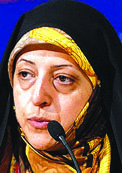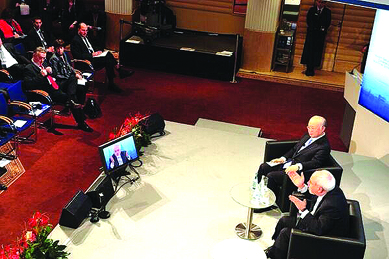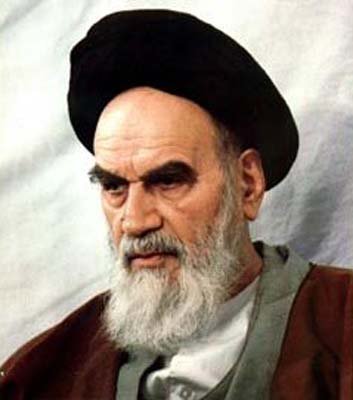February 21-2014

. . . fluent English
Masoumeh Ebtekar was born in Tehran to a middle-class family, but gained fame as the English-speaking spokesperson for the Iranian students who occupied the US embassy in 1979.
Ebtekar, who speaks fluent English, became a fixture on American television sets that year and was known as Mary.
At the age of three, Ebtekar’s family had moved from Iran to the United States, where her father went on to earn his Ph.D. at the University of Pennsylvania. For six years, first living in Worcester, Massachusetts, then in Upper Darby, a suburb just outside Philadelphia, Ebtekar received a suburban American upbringing.
Ironically, another student—this one from Israel—young Binyamin Netanyahu, lived just a few miles north in Wyncote, Pennsylvania, also learning perfect English.
After elementary school, Ebtekar’s family returned to Iran, Later, she enrolled in Tehran Polytechnic University, where students who knew her fluency in English, recruited her after the US embassy was seized and the students were besieged by the international media.
She spoke at length earlier this month with ABC News, where she explained how she got the name Mary.
“I thought I would introduce myself as someone in between, trying to make a connection, and I would use a name that would be meaningful for another culture…. So I chose the name Mary.”
In 2005, she was named as the country’s first female deputy president by President Mohammed Khatami, and this year returned to the same post under President Hassan Rohani. Neither man was willing to name a woman to the cabinet; ministers, unlike deputy presidents, require Majlis approval and they chose not to risk a clash with the Majlis and conservative clerics.
Ironically, the sole woman to serve as a minister was named by President Ahmadi-nejad—who later fired Health Minister Marziyeh Vahid-Dastjerdi when she said the shortage of medications in the country wasn’t the fault of sanctions but of the Central Bank denying her Health Ministry the foreign exchange needed to import medicines.
Ebtekar never revealed her true name when she was the spokesperson at the captured embassy. Nor did she reveal her background when Khatami named her to head Iran’s Environmental Protection Agency as deputy president. She came out of the closet only after Elaine Sciolino, a reporter for The New York Times, thought she recognized Ebtekar as Mary and confronted her.
In her interview with ABC News, Ebtekar spoke at length about her desire for Iran and America to work jointly on issues that affect both countries, particularly wildlife conservation and the environment.
She also expressed hope that the new spirit of openness and change would translate into better relations with the West. “It’s very significant,” she told ABC News.
“The policy of President Rohani has been to promote an atmosphere of moderation in Iran,” she said. “Moderation and dialogue not only within Iranian society but also with international community. So moderation is the key word here.
“Together, the US and Iran could work against violence, against radicalism, against militarism in this part of the world, [and that] would lead to regional peace and stability but also global peace and stability,” she said.
























